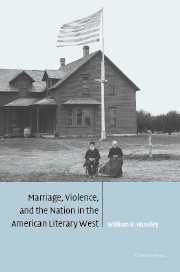Book contents
- Frontmatter
- Contents
- List of illustrations
- Acknowledgments
- Introduction
- 1 Western unions
- 2 Turner's rhetorical frontier
- 3 Marrying for race and nation: Wister's omniscience and omissions
- 4 Polygamy and empire: Grey's distinctions
- 5 Unwedded West: Cather's divides
- 6 Accident and destiny: Fitzgerald's fantastic geography
- 7 Promises and betrayals: Joan Didion and Wallace Stegner
- Afterword
- Notes
- Index
5 - Unwedded West: Cather's divides
Published online by Cambridge University Press: 22 September 2009
- Frontmatter
- Contents
- List of illustrations
- Acknowledgments
- Introduction
- 1 Western unions
- 2 Turner's rhetorical frontier
- 3 Marrying for race and nation: Wister's omniscience and omissions
- 4 Polygamy and empire: Grey's distinctions
- 5 Unwedded West: Cather's divides
- 6 Accident and destiny: Fitzgerald's fantastic geography
- 7 Promises and betrayals: Joan Didion and Wallace Stegner
- Afterword
- Notes
- Index
Summary
While Owen Wister bemoaned those unequal classes of variously non-Anglo-Saxon Americans and Zane Grey exploited briefly but successfully the evil Mormon polygamist, each of them defining their masculine hero against a denigrated other, Willa Cather's fiction upsets any formulaic expectations about heroism and the West that her settings might initially instill in her readers. If Cather shared with Grey and Wister a romantically nostalgic view of the West, she parted company with them – whatever their other aesthetic differences – by refusing to marry masculinity with heroic power and by refusing to Anglify the western landscape or homogeneously Americanize her characters. (“This passion for Americanizing everything and everybody is a deadly disease with us,” she commented in 1924.) Cather's West is distinguished from that of Turner, Wister, and Grey in significant part by the fact that she refuses to synthesize the oppositions – man/wilderness, East/West, men/women – that structure various forms of western nationalism. Across the divides she leaves unreconciled, such terms take on new meaning. While the formula Western enacted its allegories of national unity through the lens of heterosexual romance and marriage, Cather's western marriages (and non-marriages) are allegories of the refusal to do so. Nor do representations of violence in Cather's fiction serve an ideological point in the cause of nationalism. Cather undercut the alignment of both masculinity and marriage with nation-building out West and criticized the most homogenizing forms of Americanization, setting all of this against a Naturalist's landscape that revealed people to be small, distinct, transient, and yet heroically enduring.
- Type
- Chapter
- Information
- Marriage, Violence and the Nation in the American Literary West , pp. 125 - 158Publisher: Cambridge University PressPrint publication year: 2002

